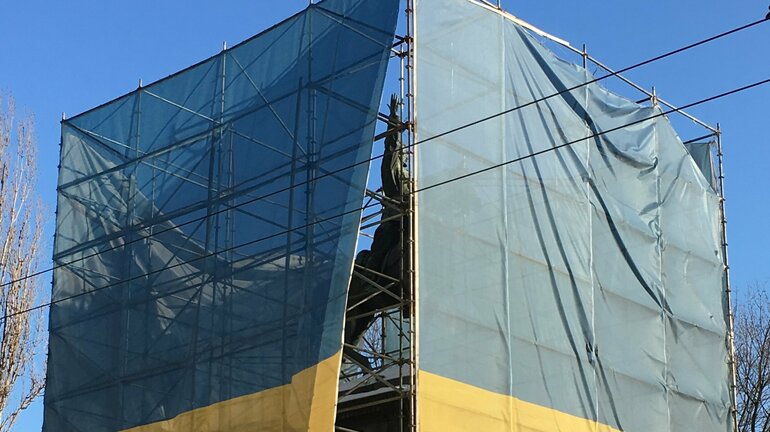Memory and history in Ukraine after the Euromaidan

More than four years have passed since the end of the mass protests on Kyiv’s Independence Square and in many other Ukrainian cities that became known as the Euromaidan. Much has changed since then. Russia has annexed Crimea, and Ukraine has found itself embroiled in a military conflict in the east of the country, where Russian-backed separatists have announced the independence of breakaway republics.
When protesters gathered on the streets in November 2013, they demanded, among other things, reforms that would establish European values in the country. Bringing the reforms about proved to be a challenging task. Nevertheless, some reforms did take place. Probably the most visible changes took place in the areas of history and memory politics. As a result of decommunisation laws adopted in spring 2015, more than 50,000 places have been renamed as of 2018.
Early reform efforts
In the early 1990s, the Ukrainian state authorities were slow in implementing changes to memory politics nationwide. The first memory law in Ukraine was adopted in April 1991. It was entitled ‘The Law on Rehabilitation of Victims of Political Repressions in Ukraine’ and was declarative and symbolic in nature. The rehabilitation process never reached similar levels to attempts in Poland or the Czech Republic to purge government officials, for instance. The law was amended in 2018 with a clear emphasis on rehabilitation and claims for justice, but it is too early to judge in what direction this law will lead in practice.
The Ukrainian state authorities in the 1990s were reluctant to alter their approaches to historical memory, and local demands to change memory politics on questions arising from the Second World War were not met for years. The main demands related to legal changes to the status of veterans of the Ukrainian Insurgent Army (UPA) that would have enabled veterans to receive state payments equal to those of Red Army veterans. Even now, after one of the decommunisation laws has granted UPA soldiers the status of ‘fighters for Ukrainian independence’, the question of veterans’ payments remains a responsibility of regional councils.
This example demonstrates a general tendency of memory politics in the 1990s: memory work was relegated to local city councils, which could amend regional memory spaces in accordance with the political visions of regional elites. As a result of this regional approach to history, most of the monuments to Lenin were demolished in the western regions of Ukraine in the 1990s. Thus, the post-Euromaidan decommunisation campaign has not influenced these regions to the same degree as eastern and central parts of the country.
Back in the 1990s, demands to dismantle Soviet monuments and change Soviet place names went hand in hand with demands for the right to tell the nation’s own history, a right that was violated during Soviet times. The whole project of history writing and establishing new memory politics was framed by memory actors (local historians, politicians, and state officials) in terms of reclaiming the past. Ukrainian history was presented as the silenced history of a colonial nation that in 1991 gained a chance to tell its own story.
However, as with any attempt to construct a national memory, this effort was selective. Memory politics excluded narratives that might undermine the glorious narrative of the victimised nation that rose through the traumas of the past and told a heroic story of Ukraine’s eternal struggle for independence. In such a construct, the Soviet past was presented as a friction in the continuum of Ukrainian statehood and nationhood. In this respect, the important feature was securitisation of the past, and so the past was presented as a matter of national security. A Soviet narrative of this past was presented as a threat to national security and to the existence of the nation.
Securitisation of the past is not a new phenomenon in Eastern Europe. In Poland and the Baltic states, this approach was adopted in official discourse on memory politics in the 1990s. The peculiarity of Ukraine is that securitisation of the past was practised mainly in regional memory politics.
The securitisation of history after the Euromaidan
After the events of 2013–4, securitisation of history shifted from a regional to a national level. Perhaps the most illustrative case was the adoption of the decommunisation laws. Volodymyr Viatrovych, the director of the Ukrainian Institute of National Memory, has argued that these laws were directly connected with the security of the country and even claimed that if such laws had been adopted earlier, there would probably have been no conflict in the east of the country.
Many historians in Ukraine and abroad have criticised these laws for limiting the freedom of speech. Nonetheless, they were adopted, because they were framed as a matter of security in a country at war. These laws operate in the dogmatic framework of history writing, where there is a strong belief that there is only one correct interpretation of history and, more importantly, that the state can punish any deviation from this interpretation.
Thus, these laws, while aiming to reduce the role of ideology in Ukraine, instead run the risk of doing the opposite when it comes to history and memory. At the same time, one of the decommunisation laws guarantees open access to archives that have been classified for decades. This step is unlikely to contribute to a dogmatic, ideologised, one-sided writing of history. More probably, increasing access to archives will boost historical research and trigger more debates on Ukraine’s difficult past.
Yuliya Yurchuk is a postdoctoral researcher at the History Department at Södertörn University, Sweden. She specialises in memory studies, the study of nationalism in Eastern European countries, and postcolonial studies. From April to June 2018, she was a visiting fellow in the Research Network Prisma Ukraïna at Forum Transregionale Studien; during her stay she was affiliated to ZOiS.